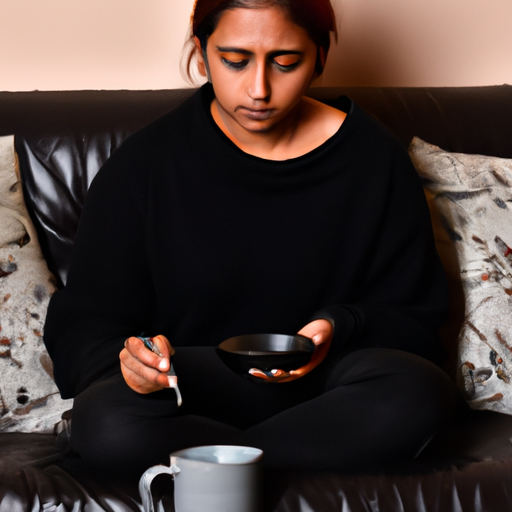Being someone who has difficulty sleeping well, I am constantly searching for natural solutions that can assist me in relaxing and falling asleep. Lately, there has been a lot of talk about ginger turmeric tea and its potential to promote sleep. However, I wonder if there is any validity to these statements, or if it is simply another passing health fad?
In this article, I’ll be exploring the science behind ginger turmeric tea, its potential effects on sleep, and whether or not it’s worth incorporating into your bedtime routine.
Ginger turmeric tea is a blend of two powerful root spices that have been used for centuries in traditional medicine. Ginger is known for its anti-inflammatory and digestive benefits, as well as its ability to boost alertness and concentration. Turmeric, on the other hand, is prized for its anti-inflammatory, antioxidant, and pain-relieving properties.
While these two spices have distinct benefits on their own, many people believe that combining them in a tea can create a potent elixir for relaxation and sleep. But is there any scientific evidence to support these claims? Let’s find out.
Key Takeaways
- Ginger turmeric tea has anti-inflammatory properties that can help reduce inflammation in the body, leading to better sleep.
- Ginger has sedative effects and can help promote relaxation and reduce anxiety, aiding in sleep.
- Turmeric has sleep benefits and can promote relaxation, contributing to better sleep.
- Incorporating healthy habits into daily routine, along with drinking ginger turmeric tea, can improve overall sleep quality.
What is Ginger Turmeric Tea?
If you haven’t tried it yet, you’re missing out on the amazing benefits of ginger turmeric tea! This tea is made by steeping fresh ginger root and turmeric root in hot water.
Ginger turmeric tea is known for its incredible health benefits, particularly for digestion. The ginger in the tea helps to soothe the digestive system, reducing bloating and gas. Turmeric, on the other hand, has anti-inflammatory properties, which can help to reduce inflammation in the gut.
Ginger turmeric tea has a rich history and cultural significance in Ayurvedic medicine. Ayurveda is an ancient Indian system of medicine that emphasizes the use of natural remedies and practices to promote health and well-being. Ginger and turmeric have been used in Ayurvedic medicine for centuries to treat a wide range of health conditions, including digestive issues, inflammation, and pain.
Now, science is beginning to uncover the incredible health benefits of this powerful tea. The link between ginger and alertness is just one example of the many ways in which this tea can benefit your health.
The Link between Ginger and Alertness
Discover the surprising connection between ginger and feeling more awake. Ginger has been shown to have a positive impact on cognitive function, specifically alertness and memory enhancement. This is due to the presence of compounds like gingerol and shogaol, which have been found to improve reaction time and increase attention span.
In a study published in the journal Evidence-Based Complementary and Alternative Medicine, participants were given either a placebo or a ginger supplement before being tested on their cognitive abilities. The results showed that those who took the ginger supplement performed better on tasks related to attention and reaction time. These findings suggest that incorporating ginger into your diet, such as through ginger turmeric tea, may have a positive impact on your ability to stay focused and alert throughout the day.
Moving onto the subsequent section about the relaxing properties of turmeric, it’s important to note that ginger and turmeric are often combined in teas and other recipes for their complementary health benefits. While ginger may help with alertness and cognitive function, turmeric is known for its calming and anti-inflammatory properties. So, the combination of ginger and turmeric in a tea can provide a balance of both energizing and relaxing effects.
The Relaxing Properties of Turmeric
You can experience a sense of calm and relaxation by incorporating a natural ingredient into your diet that is known for its anti-inflammatory properties. Turmeric, a spice commonly used in Indian cuisine, has been found to have relaxing effects on the body. Curcumin, the active ingredient in turmeric, has been shown to have a positive impact on mood and anxiety levels.
In addition to its mood-enhancing properties, turmeric has also been found to have sleep benefits. A study published in the Journal of Herbal Medicine found that turmeric extract improved sleep quality in participants who had trouble sleeping. This could be due to the anti-inflammatory properties of curcumin, which can help reduce pain and discomfort that may interfere with sleep. Incorporating turmeric into your diet, whether through supplements or ginger turmeric tea, may be a natural way to promote relaxation and improve sleep.
As we explore the potential benefits of turmeric, it’s important to also consider the role of ginger in the equation. Does ginger turmeric tea really make you sleepy? Let’s dive into the next section to find out.
Does Ginger Turmeric Tea Really Make You Sleepy?
Incorporating ginger turmeric tea into your nightly routine may have a calming effect on your body and promote a restful night’s sleep. Ginger and turmeric both have natural anti-inflammatory properties that can help reduce inflammation in the body, which can lead to better sleep. Additionally, ginger has been found to have sedative effects and can help promote relaxation and reduce anxiety.
There are various ginger turmeric tea recipes available that can be easily incorporated into your nighttime routine. One popular recipe includes steeping sliced ginger and turmeric in hot water for several minutes, then adding honey and lemon for added flavor and benefits.
However, it’s important to note that individual factors such as diet, stress levels, and overall health can affect the tea’s effectiveness in promoting sleep.
Transitioning into the subsequent section, while ginger turmeric tea can have benefits for promoting sleep, there are several factors that can affect its effectiveness.
Factors that Affect the Tea’s Effectiveness
Now let’s explore what factors can impact how effective ginger turmeric tea is for improving sleep. It’s important to consider that sleep duration and caffeine intake can have a significant impact on how well you sleep. Here are a few things to keep in mind:
-
Sleep duration: Getting enough sleep each night is crucial for overall health and wellbeing. If you’re not getting the recommended 7-9 hours of sleep each night, it can be difficult to fall asleep and stay asleep. Adding ginger turmeric tea to your bedtime routine may help, but it’s important to also address any underlying sleep issues you may have.
-
Caffeine intake: Consuming caffeine, even in small amounts, can make it difficult to fall asleep and stay asleep. Be mindful of how much caffeine you’re consuming throughout the day, and try to limit your intake in the hours leading up to bedtime. Opting for caffeine-free herbal teas, like ginger turmeric tea, can be a great way to wind down in the evening without disrupting your sleep.
-
Lifestyle habits: There are several other lifestyle habits that can impact your ability to get a good night’s rest. Things like exercise, diet, and stress levels can all play a role in how well you sleep. Incorporating healthy habits into your daily routine, along with drinking ginger turmeric tea, can help improve your overall sleep quality.
With these factors in mind, you can work towards creating a bedtime routine that promotes restful sleep. One way to start is by making a cup of ginger turmeric tea before bed.
How to Make Ginger Turmeric Tea
To make ginger turmeric tea, start by boiling water and adding sliced ginger and grated turmeric. Allow the mixture to steep for about 10 minutes before straining and serving.
This tea isn’t just delicious but has numerous health benefits, such as reducing inflammation, aiding digestion, and boosting the immune system. There are also variations in flavor that can be achieved by adding other ingredients like honey, lemon, or cinnamon.
These additions not only enhance the taste of the tea but also provide their own health benefits. In the next section, we’ll explore other variations of ginger turmeric tea that you can try at home.
Other Variations of Ginger Turmeric Tea
Get ready to tantalize your taste buds with these delicious variations of ginger turmeric tea that will leave you feeling rejuvenated and refreshed. Not only is this tea a great way to start your day, but it also has numerous health benefits. Turmeric, the main ingredient in the tea, is known for its anti-inflammatory properties and can help with conditions such as arthritis, diabetes, and even cancer. Ginger, on the other hand, has been used for centuries to treat nausea, indigestion, and sore throat.
To add a little twist to your ginger turmeric tea, try these variations:
| Variation | Ingredients |
|---|---|
| Golden Milk | turmeric, ginger, coconut milk, honey |
| Spiced Tea | turmeric, ginger, cinnamon, cloves, honey |
| Lemon Ginger | turmeric, ginger, lemon juice, honey |
| Orange Spice | turmeric, ginger, orange peel, cinnamon, honey |
| Pineapple Turmeric | turmeric, ginger, pineapple juice, honey |
These variations not only taste great but also provide added health benefits. For instance, the golden milk variation contains coconut milk, which is rich in healthy fats and can help with weight loss and improve heart health. The spiced tea variation contains cinnamon, which is known to lower blood sugar levels and improve brain function. Experiment with different combinations and find the one that suits your taste buds the best.
Speaking of sleep, while ginger turmeric tea can help with digestion and reduce inflammation, it may not necessarily make you sleepy. However, there are other herbal teas that can help you get a good night’s rest. Let’s explore some of these options in the next section.
Other Herbal Teas that Can Help You Sleep
If you’re having trouble sleeping, herbal teas can be a relaxing and natural way to help you drift off to dreamland. Chamomile tea is a popular choice for its calming properties. It contains apigenin, a compound that binds to certain receptors in the brain that may promote sleepiness and reduce anxiety. Research has shown that drinking chamomile tea can improve the overall quality of sleep, making it a great alternative to sleeping pills.
Another herbal tea that can help you sleep is valerian root. Valerian root has been used for centuries as a natural sedative and sleep aid. It works by increasing the amount of GABA in the brain, a neurotransmitter that promotes relaxation and sleep. While more research is needed to fully understand its effects, valerian root has been shown to improve sleep quality and reduce the time it takes to fall asleep.
Additionally, the benefits of aromatherapy for sleep cannot be overlooked. Essential oils like lavender, bergamot, and chamomile can be diffused or added to a warm bath to help calm the mind and promote relaxation.
Improving sleep quality is crucial for overall health and well-being. In addition to herbal teas and aromatherapy, there are other ways to promote better sleep, such as establishing a consistent sleep schedule, avoiding caffeine and alcohol before bedtime, and creating a relaxing sleep environment.
Other Ways to Improve Sleep Quality
When it comes to improving sleep quality, there are a few key areas that I like to focus on: sleep hygiene, lifestyle changes, and professional help.
Sleep hygiene refers to the behaviors and habits we engage in around sleep, such as establishing a consistent sleep schedule and creating a relaxing sleep environment.
Lifestyle changes might include things like increasing physical activity or reducing caffeine intake.
And for some individuals, seeking professional help from a healthcare provider or sleep specialist may be necessary to address underlying sleep disorders.
By taking a comprehensive approach to improving sleep, we can often see significant improvements in both the quality and quantity of our rest.
Sleep Hygiene
Maintaining good sleep hygiene is crucial for getting a good night’s rest. This involves establishing a consistent bedtime routine and limiting screen time before sleep. A sleep tracker can also be useful in helping you determine how much sleep you need and tracking how well you are sleeping.
Creating a bedtime routine can help signal to your body that it’s time to wind down and prepare for sleep. This routine can include activities such as taking a warm bath, reading a book, or listening to calming music. Additionally, limiting screen time before bed and avoiding stimulating activities can help you relax and fall asleep more easily.
By prioritizing good sleep hygiene, you can improve the quality of your sleep and wake up feeling refreshed and energized.
Incorporating lifestyle changes can also contribute to better sleep.
Lifestyle Changes
To improve your sleep, try implementing lifestyle changes such as exercise and a healthy diet. These changes can positively impact your overall health and well-being, leading to better sleep quality. Here are some lifestyle changes that can help improve your sleep:
-
Regular exercise routines: Engaging in physical activity during the day can help regulate your sleep-wake cycle, leading to better sleep quality at night. Try to aim for at least 30 minutes of moderate-intensity exercise each day.
-
Healthy diet: Eating a balanced diet can help improve your sleep quality as well. Avoiding heavy meals before bedtime and limiting caffeine and alcohol intake can also help.
-
Meditation techniques: Mindfulness meditation can help reduce stress and anxiety, which are common causes of sleep problems. Incorporating meditation into your daily routine can help calm your mind and promote relaxation.
-
Sleep hygiene: Creating a sleep-conducive environment, such as keeping your bedroom cool and dark, can help promote restful sleep.
Incorporating these lifestyle changes into your daily routine can significantly improve your sleep quality. However, if these changes don’t improve your sleep, it may be time to seek professional help.
Professional Help
In my experience, making lifestyle changes to improve sleep quality can be helpful, but sometimes it’s not enough. That’s when seeking professional help may be necessary. In particular, counseling sessions or seeing a sleep specialist can be beneficial in addressing underlying issues that may be contributing to poor sleep.
When it comes to seeking professional help for sleep issues, there are a few options to consider. Counseling sessions can help individuals address any emotional or psychological factors that may be impacting their sleep, such as stress or anxiety. Sleep specialists, on the other hand, can offer more targeted interventions for sleep disorders, such as sleep apnea or insomnia. In some cases, a combination of both approaches may be necessary for optimal results.
To illustrate these options, here is a table outlining the differences between counseling sessions and seeing a sleep specialist:
| Counseling Sessions | Sleep Specialist |
|---|---|
| Focuses on emotional/psychological factors impacting sleep | Focuses on diagnosing and treating sleep disorders |
| May involve talk therapy, cognitive behavioral therapy, or other interventions | May involve sleep studies, medication management, or other treatments |
| Generally recommended for individuals with mild to moderate sleep issues | Generally recommended for individuals with more severe sleep issues or suspected sleep disorders |
| Can be helpful in addressing underlying stress, anxiety, or other psychological factors contributing to poor sleep | Can provide targeted interventions for specific sleep disorders |
Overall, seeking professional help for sleep issues can be a valuable step in improving sleep quality and overall well-being. Whether through counseling sessions, seeing a sleep specialist, or a combination of both, individuals have options for addressing sleep issues and getting the rest they need.
Frequently Asked Questions
What are the potential side effects of drinking ginger turmeric tea?
Before trying ginger turmeric tea, it’s important to understand potential risks and precautions. Interactions and contraindications with medications should be considered. Always consult with a healthcare professional before adding any new substance to your routine.
Can ginger turmeric tea help with anxiety or stress?
I find that herbal alternatives like ginger turmeric tea can help with anxiety and stress. Along with mindfulness techniques, they can provide a natural way to relax and soothe the mind. However, specific research on ginger turmeric tea’s effectiveness for anxiety is limited.
Can ginger turmeric tea be consumed during pregnancy or while breastfeeding?
Before consuming ginger turmeric tea during pregnancy or breastfeeding, it is important to weigh the benefits and risks. While it has potential anti-inflammatory properties, it is best to consult with a healthcare professional for proper dosage and nutritional value.
How long does it take for ginger turmeric tea to take effect?
The benefits of ginger turmeric tea can take effect within 30 minutes to an hour after consumption. It’s recommended to consume 1-2 cups daily, with each cup containing 1 teaspoon of turmeric and 2 teaspoons of ginger.
Can ginger turmeric tea be consumed at any time of day or is it best consumed before bed?
Ginger turmeric tea has numerous benefits when consumed in the morning. It can improve digestion, reduce inflammation, and boost the immune system. There are many recipes for making ginger turmeric tea at home, including variations with black pepper and honey.
Conclusion
In conclusion, after researching and trying ginger turmeric tea myself, I can confidently say that it doesn’t make you sleepy. While ginger has been linked to alertness and turmeric has relaxing properties, the combination of the two doesn’t seem to have a significant effect on sleepiness.
However, this doesn’t mean that ginger turmeric tea isn’t worth trying. It’s a delicious and healthy drink that can provide various health benefits.
Overall, finding ways to improve sleep quality is important for our physical and mental well-being. While ginger turmeric tea may not be the solution to sleepiness, there are other herbal teas that can help promote relaxation and improve sleep.
It’s also important to establish healthy sleep habits, such as a consistent sleep schedule and a relaxing bedtime routine. By taking care of our sleep, we can improve our overall quality of life.










